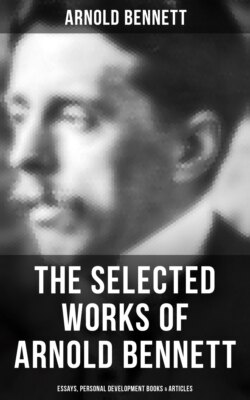Читать книгу The Selected Works of Arnold Bennett: Essays, Personal Development Books & Articles - Arnold Bennett - Страница 45
На сайте Литреса книга снята с продажи.
Writing.
ОглавлениеThe aspirant should study English composition. This advice may seem unnecessary, but many writers never study composition. They write — and trust in Heaven to save them from doing anything absolutely fatuous. They have no notion of the canons of composition. They commit literary sins against good form so atrocious that social sins of the same heinousness would banish them from the dinner-tables of decently - bred people. These writers abound, and their existence is a blot on English letters. No one can write correctly without deliberately and laboriously learning how to write correctly. On the other hand, every one can learn to write correctly who takes sufficient trouble. Correct writing is a mechanical accomplishment; it could be acquired by a stockbroker. The best book on the subject is Professor John Nichol’s English Composition, published by Messrs. Macmillan at a shilling. The companion volume, Questions and Exercises on English Composition, same publishers and price, should also be obtained. Professor Nichol deals with punctuation, but many students will be glad to have Stops; or, How to Punctuate, by Mr. Paul Allardyce, published by Mr. Fisher Unwin. In these quite small books the aspirant may gather all the technical information necessary to good composition, from the use of a comma to the placing of a participial phrase in a complex sentence, from the avoidance of solecisms to the proper management of similes and metaphors.
So guided, the aspirant should regularly practise writing. He must write for the sake of writing. He should write from five hundred to a thousand words a day, according to his leisure and facility. As an athlete trains, as an acrobat painfully tumbles in private, so must the literary aspirant write. I do not much care what he writes about, at the commencement, if only he writes enough; but the better his subjects the more useful and the more interesting will be his practice. He may try to report conversations (an excellent device), or to describe episodes, scenes, and persons. Or he may compose essays, articles, or short stories, "not necessarily with a view to publication, but as a guarantee of good faith.” The one paramount rule is that he must always write his best; he must never leave a sentence until he is convinced that he cannot improve it. Any lack of conscientious endeavour after the best will vitiate the most regular and persistent practice. Everything written should be read aloud, if possible to another person—not immediately, but after an interval of several days. The test of reading aloud is a severe one — perhaps the most severe test to which literature can be put— and it will certainly disclose errors, weaknesses, and crudities that might otherwise have escaped attention; it is particularly valuable as an aid to the decision of questions of punctuation, for where the voice of the reader pauses, there ought the comma to be.
Concurrently with his writing, the aspirant must read and study good models. I need not give a list of good models, since every one is acquainted with the names of the masterpieces of English literature. The important thing is that the aspirant should study most those masterpieces which most strongly appeal to him. If Thackeray, or Stevenson, or Sir Thomas Browne, or Charles Lamb specially attract him, let him, in the early stages, imitate Thackeray, Stevenson, Browne, or Lamb. Let him deliberately imitate them; the act will help him in the end to arrive at his own originality. He may even go so far as to paraphrase, from memory, the favourite passages of his favourite authors; the subsequent comparison of the paraphrase with the exemplar will be an education for him.
